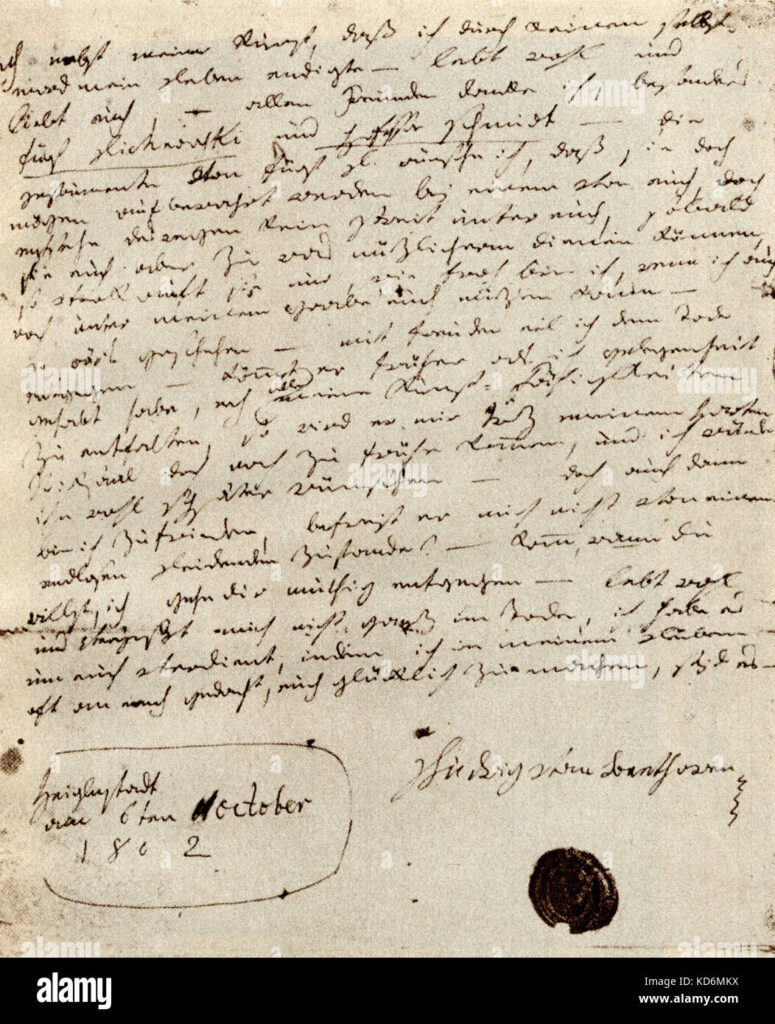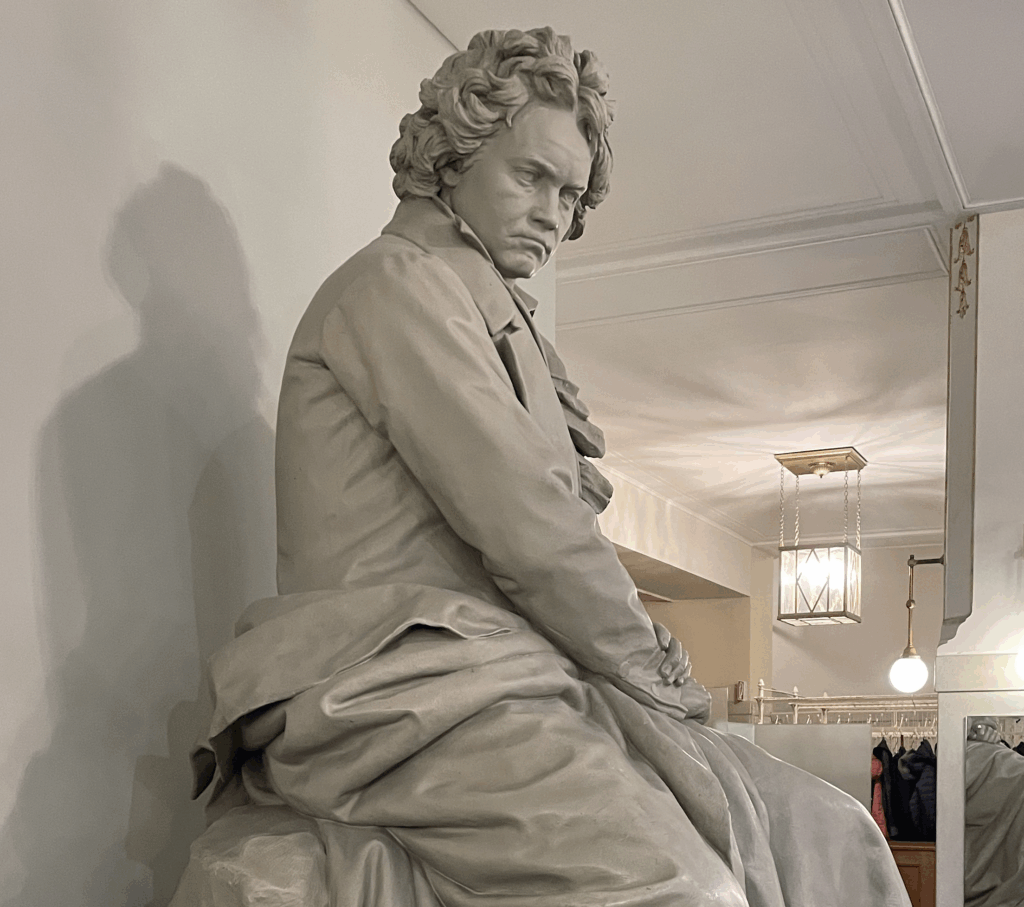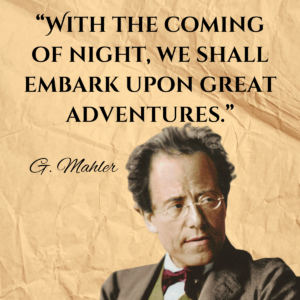KEY TAKEAWAYS
• Beethoven is considered a classical composer, but his musical style is too unique and groundbreaking to call him purely classical.
• In his early period he ‘played by classical rules’; however, as his deafness progressed, his music became more sensitive and complex.
• He truly made music a form of self-expression, where he depicted his own philosophy, views on society, and personal struggles.
•Beethoven was the last Classical and first Romantic composer.
Ludwig van Beethoven – one of the most significant names in music and probably the most famous classical composer. He composed sublimely excellent music while being completely deaf by the end of his life and became one of founding fathers of Romanticism.
Beethoven revolutionized classical music and gave it a new meaning, making it a form of pure self-expression, his own philosophy, and views on an ideal society. He often composed it under the weight of his own life difficulties, which gave his masterpieces more personal meaning.
Throughout his life, his views – and with them, his music – changed significantly. He was never constrained by the fashions of his time and always went against the grain, implementing new principles and ideas in his music.
He hardly ever strictly followed the guidance of his mentors like Haydn, which audiences were expecting from him. Instead, he pursued his own ideas and changed the course and appreciation of music in general.
Listening to some of his early compositions, one can hear a very clear classical tone in the best traditions of Mozart and Haydn. However, with time, his music became more innovative and imaginative.
In light of this, Beethoven’s musical style became so unprecedented and revolutionary that it is hard to define whether he was Classical or Romantic composer.
At the end of this article, you may change your view on Beethoven’s music and what it is all about as we discuss it as a whole, from the very beginning to his final pieces. We will take a deeper look at how his music evolved over time and what makes Beethoven different from his predecessors like Mozart. And finally, we will answer the question, ‘Was Beethoven a Romantic or Classical composer?’

Subscribe to Classical Echoes Newsletter!
The Classical Rebel
Beethoven was born in 1770 in Germany, into a musical family. His mother was a gentlewoman who worked as a housemaid, and his father was a court singer. Beethoven’s grandfather, also named Ludwig, was a successful Kapellmeister in Bonn and an influence on young Ludwig Junior, even though he died when Beethoven was only 3.
Beethoven’s father, on the other hand, wasn’t that successful and drank a lot. He was jealous of Leopold Mozart, who had been touring all around Europe with his young genius son Wolfgang, making a good fortune.
Johann van Beethoven taught little Ludwig for hours and forced him to practice piano and violin. He often hit his hands for mistakes and wrong keys, forcing the young boy to stay at home all day at the piano, sometimes skipping school – not to mention missing out on outside life with friends.
Despite all father’s despotism, Beethoven didn’t lose his passion for music and still loved playing and composing. He wrote his first piano work at the age of 12, which was already technically demanding and brilliant.
He was very famous in his native Bonn, but outside, nobody knew about Beethoven and his talent. This made him travel to Austria, to Vienna, to meet with the musical elite and receive further tuition and mentorship.
Particularly, Beethoven’s idol was, not surprisingly, Mozart, who had a huge impact on Beethoven’s musical views. They met only once, and Mozart said, “Watch out for that Beethoven boy. One day he will give the world something to talk about.”
Mozart’s influence was crucial in shaping Beethoven’s early style. Their music was very similar in terms of elegance and sound clarity, with clear motifs and theme development. However, in its nature, it was still purely classical, with not much deviation or innovation.
Additionally, Beethoven was a student of Haydn, who also taught Mozart. Haydn’s views on music were more conservative, which often led to conflicts in views between him and Beethoven. For example, Haydn described Beethoven’s piano trio as “Too many notes.”
To be fair, Beethoven was mostly on his own and didn’t take much from Haydn. He was often criticized for his use of contrasts and overall exaggerated compositional techniques. This only added to his popularity, and he became more and more recognizable in Vienna.
What really made Beethoven groundbreaking was his improvisational skills. He was a master of improvisation, being able to turn a simple theme into a piano masterpiece. There was nobody close enough to compare with him, and Beethoven just destroyed his opponents.
His talent for improvisation became crucial for music. He showed that music is not just a science of notes but comes directly from the heart, making it a form of self-expression. This explains why even early Beethoven is so musically rich and dramatic.
While early Beethoven’s style was clearly similar to that of late Mozart, we see that he had already started to shift the meaning of music and break classical traditions. He could not surpass Mozart in compositional perfection – and he didn’t have to – because Beethoven wanted to be Beethoven, not the Second Mozart.
Piano Trio no. 3 in C minor: IV – Prestissimo (yt. soner yorgun)
Beethoven: The Last Classicist – the first Romantic
By the middle period of his life, Beethoven began to go through a period of transition. His views on life and his role in the world started to change, which in turn led to a transformation in his music. These changes were triggered by some unfortunate events in his life.
Firstly, by the age of 30, Beethoven started to notice a buzzing noise in his ears and couldn’t hear some of the common sounds around him. The possibility of becoming completely deaf was terrifying and seemed like the end of his musical career.
Additionally, Beethoven struggled in his personal life. He had many short-lived relationships but was never able to find the true love of his life. He was often rejected because he wasn’t of ‘noble birth’ or due to his generally unsociable behavior.
These factors only contributed to his depression and led to more anger and rudeness toward others. In his deeply personal letter to his brother Carl, now known as the Heiligenstadt Testament, Beethoven confesses that he considered ending his life, but only art held him back.
It’s no wonder that these personal struggles were strongly reflected in his music. With no one to confide in, the only thing left was to express himself through music – to reveal his inner world in ways that words never could.
These struggles led to some of his most profound and iconic compositions, such as the Moonlight Sonata and Fifth Symphony, which were unprecedented in the history of music. They were so emotionally deep and innovative that they immediately got the audience’s attention.
Particularly, the Moonlight Sonata and Eroica Symphony became the first works now considered Romantic pieces. Beethoven gave his music a new purpose – it became a form of self-expression meant to evoke specific feelings in the listener.
The defining feature of Beethoven’s music became individualism. He was at the center of most of his compositions, and their spirit was a direct reflection of his personality and beliefs. In the Eroica Symphony, he expresses his ideals inspired by the French Revolution and libertarian views, depicted in a heroic and monumental symphony.
Now, music finally gained meaning, no longer just a well-balanced harmony, but something that spoke to the soul. Beethoven became a symbol, and his music united thousands who shared in his beliefs and philosophy.
Beethoven was the first in music – and one of the first in any art form – to lay the foundation for Romanticism, turning music into a means of self-expression. This new movement completely changed the way people experienced music and the role of the composer within it.
Beethoven was obsessed with antiquity and actively applied principles of oratory from ancient speakers into his compositions. Many of his works follow a strict, classical structure, which he transformed into something more profound and meaningful.
Beethoven’s individualism and emotional expression, the imagery and symbolism in his work, make his music revolutionary and give it a new significance. The life circumstances and his hearing loss transformed Beethoven’s worldview and opened up a new, previously unexplored world for him.

Heiligenstadt testament (alamy)
A Revolutionary Composer
As Beethoven became older and older, his musical tastes changed dramatically. He was undeniably the greatest living composer of his time, and there were very few to compare himself with. He was the one who set trends and directions in which music should evolve.
He never stayed in one place and continued to move forward, pushing the boundaries and setting new standards of beauty in music. Due to hearing loss and isolation, he was fully immersed in his thoughts and imagination.
In this case, deafness played a crucial role in Beethoven’s music, as he was able to directly put on paper his imagination – something unheard of before him. The music came exactly as it was in his mind, untouched and unfiltered from the perspective of the listener, which made it completely unique.
As his deafness progressed, his works became more and more complex, different, and sometimes incomprehensible. Beethoven didn’t need to comply with the audience’s expectations as he was the one to dictate the trends, not to conform to the audience.
Some of his later works were considered madness and received full recognition only decades after Beethoven’s death. It wasn’t elegant classical music anymore with catchy melodies and a pleasing, relaxing effect.
Take, for example, his Grosse Fuge, which was completed when Beethoven was 55, a year before his death. It is now considered by many, like Stravinsky and Gould, the greatest achievement in music history. But back in Beethoven’s time, it was so unprecedented and awkward that nobody quite understood it.
It was the individualism of Beethoven’s music that made it so unique and complex. His music is not about God like Bach’s or about perfection like Mozart’s, but about Beethoven himself as an artist. This is the main principle of Romanticism—an expression of the artist’s emotions and inner struggles.
Beethoven’s music is about evoking feelings that words can’t describe, to feel what Beethoven felt himself and to convey the great ideas of his own philosophy. This becomes more and more evident in his later works, where he progressively leaves traditional musical ideas and breaks free in composing.
Beethoven often addressed older musical styles like fugues and toccatas, dating back to Bach’s time. They were largely forgotten during the Classical era, but Beethoven gave them new life and masterfully implemented them in his works.
Overall, Beethoven shifted from traditional classical music and set the path toward Romanticism. While his music is still more conservative and classical in sound and structure, the meaning he embedded in his pieces and their passion are more than just beautiful harmonies and well-structured works.
It’s hard to call Beethoven purely a Classical or purely a Romantic composer. His music is already different from Mozart’s and Haydn’s, but not quite close to what is considered true Romanticism like Chopin’s or Liszt’s.
The key role of Beethoven is that he was the bridge between two eras. Music needed change, and Beethoven became the one who pushed it to its limits and revolutionized it, opening undiscovered paths for generations of great composers.






